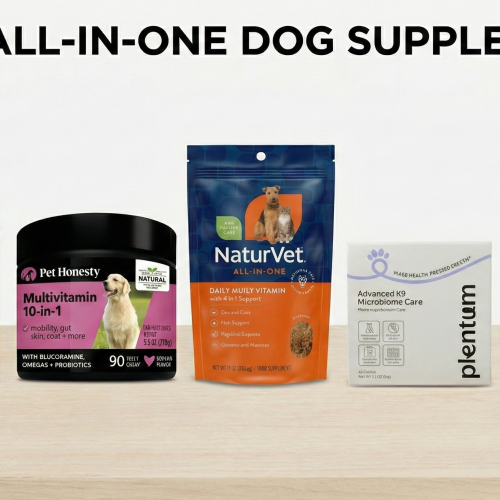Understanding your dog’s digestive health is crucial for their overall well-being, and both probiotics and prebiotics play essential roles in maintaining optimal gut function. While these terms are often used interchangeably, they serve distinct purposes in supporting canine health. Neither probiotics nor prebiotics is universally “better” than the other—they work synergistically and serve different functions in maintaining your dog’s digestive health.
Understanding Probiotics: Live Beneficial Bacteria
Probiotics are live microorganisms that provide health benefits when administered in adequate amounts. These beneficial bacteria work by colonizing your dog’s intestinal tract and supporting various physiological functions. For dogs, probiotics primarily function through several key mechanisms.
Competitive exclusion represents one of the most important probiotic mechanisms. These beneficial bacteria compete with pathogenic microorganisms for nutrients and attachment sites in the intestinal tract, effectively crowding out harmful bacteria. This process helps maintain a balanced gut microbiome and reduces the risk of gastrointestinal infections.
Probiotics also produce antimicrobial substances that directly inhibit the growth of pathogenic bacteria. Research has shown that canine-derived probiotic strains like Lactobacillus johnsonii can increase the production of short-chain fatty acids, including acetate, propionate, and butyrate, which create an acidic environment unfavorable to harmful bacteria.
Immune system modulation represents another critical function of probiotics in dogs. Studies have demonstrated that probiotic supplementation can enhance both cellular and humoral immune responses, improving your dog’s ability to fight infections and maintain overall health. One study found that elderly dogs showed the strongest response to probiotic treatment, with improvements in immune factor secretion and physiological parameters.
Common Probiotic Strains for Dogs
Veterinary research has identified several effective probiotic strains specifically beneficial for canine health. Multi-strain formulations often show superior results compared to single-strain products. The most extensively studied strains include Lactobacillus acidophilus, Bifidobacterium animalis, Enterococcus faecium, and Lactobacillus rhamnosus.
Research comparing canine-derived versus dairy-derived probiotics has shown that dog-specific strains may provide enhanced benefits. A comparative study found that canine-origin Lactobacillus johnsonii CPN23 demonstrated superior improvements in nutrient digestibility and immune responses compared to dairy-origin Lactobacillus acidophilus.
Understanding Prebiotics: Fuel for Beneficial Bacteria
Prebiotics are non-digestible compounds that selectively stimulate the growth and activity of beneficial bacteria already present in your dog’s gut. Unlike probiotics, prebiotics don’t introduce new bacteria but rather provide nutrition to support existing beneficial microorganisms.
The primary function of prebiotics involves selective fermentation by beneficial bacteria. When beneficial bacteria metabolize prebiotics, they produce short-chain fatty acids that provide energy for intestinal cells and create an environment that supports gut health. This fermentation process also helps maintain proper pH levels in the digestive tract.
Commonly used prebiotics for dogs include mannanoligosaccharides (MOS), fructooligosaccharides (FOS), and inulin. Research has shown that dietary supplementation with mannanoligosaccharides can enhance nutrient digestibility, improve immune responses, and support optimal serum lipid profiles in dogs.
Comparing Effectiveness: Research Findings
Scientific evidence suggests that both probiotics and prebiotics provide significant health benefits for dogs, but through different mechanisms. A comprehensive review of canine gut health research indicates that probiotics excel in providing immediate bacterial colonization and immune support, while prebiotics offer sustained nourishment for existing beneficial bacteria.
Synbiotic formulations, which combine probiotics and prebiotics, have shown particularly promising results. Research demonstrates that healthy dogs receiving synbiotic supplementation showed individualized responses, with some dogs experiencing significant improvements in gut microbiota diversity and stability. However, the study also revealed that responses varied considerably between individual dogs, suggesting that optimal supplementation may need to be tailored to each animal.
Clinical trials comparing probiotics alone versus combination approaches have yielded interesting findings. One study found that dogs receiving probiotic supplementation showed reduced risk of diarrhea during treatment periods, while no adverse effects were observed in healthy dogs. Another investigation demonstrated that probiotic treatment effects were age-related, with elderly dogs showing the strongest positive responses.
Safety Considerations and Side Effects
Both probiotics and prebiotics are generally considered safe for healthy dogs when used appropriately. However, certain considerations are important for pet owners to understand.
Probiotic safety concerns primarily relate to strain selection and quality control. Research emphasizes the importance of using canine-specific strains when possible, as these are more likely to survive transit through the dog’s digestive system and establish beneficial colonization. One preliminary evaluation of Lactobacillus rhamnosus strain GG found it safe for canine administration, though the study noted that beneficial effects cannot be directly extrapolated between species.
Quality and genetic stability of probiotic products represent crucial safety factors. Recent research has highlighted concerns about some probiotic strains carrying antibiotic resistance genes or other potentially harmful genetic elements. This underscores the importance of choosing high-quality, veterinarian-recommended products from reputable manufacturers.
Prebiotics generally present fewer safety concerns than probiotics, as they don’t introduce live microorganisms. However, excessive prebiotic supplementation can potentially cause gastrointestinal upset, including gas, bloating, or loose stools, particularly when introduced too rapidly or in excessive quantities.
Making the Right Choice for Your Dog
The decision between probiotics and prebiotics—or a combination approach—should consider several factors specific to your dog’s health status and needs. Dogs with existing digestive issues or those recovering from antibiotic treatment may benefit more from direct probiotic supplementation, as these situations often require rapid restoration of beneficial bacterial populations.
Healthy dogs may achieve optimal results with prebiotic supplementation or synbiotic formulations that support their existing gut microbiome while providing additional beneficial bacteria. The research suggests that the most effective approach often involves combining both strategies to address different aspects of gut health simultaneously.
Age appears to be a significant factor in determining optimal supplementation strategy. Studies have shown that elderly dogs demonstrate stronger responses to probiotic treatment, experiencing more dramatic improvements in immune function and gut microbiota composition. This suggests that senior dogs may particularly benefit from probiotic supplementation.
Individual variation in response represents another crucial consideration. Research has consistently shown that dogs respond differently to the same probiotic or prebiotic interventions, with some showing dramatic improvements while others experience minimal changes. This variability suggests that optimal gut health management may require individualized approaches rather than one-size-fits-all solutions.
Practical Implementation Guidelines
When implementing probiotic or prebiotic supplementation for your dog, veterinary consultation is essential. Your veterinarian can assess your dog’s specific health status, current medications, and individual risk factors to recommend the most appropriate approach.
Gradual introduction is recommended for both probiotics and prebiotics to minimize potential digestive upset. Starting with smaller doses and gradually increasing to the recommended amount allows your dog’s digestive system to adjust to the changes.
Duration of supplementation varies depending on the specific goals and your dog’s response. Some dogs may benefit from short-term supplementation during periods of stress or illness, while others may require ongoing support for chronic conditions. Regular monitoring and veterinary evaluation can help determine the optimal supplementation duration.
The evidence clearly indicates that both probiotics and prebiotics offer valuable benefits for canine health, but they serve complementary rather than competing functions. The most effective approach often involves understanding your dog’s individual needs and potentially combining both strategies under veterinary guidance. Whether you choose probiotics, prebiotics, or a synbiotic approach, the key is selecting high-quality products and monitoring your dog’s response to ensure optimal digestive health and overall well-being.






